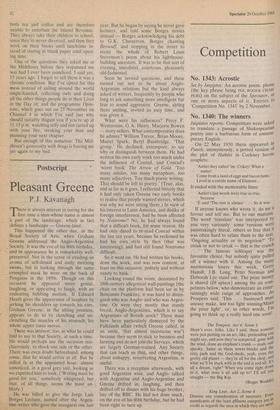Postscript
Pleasant Greene
P.J. Kavanagh
ere is always interest in seeing for the first time a man whose name is almost a part of the landscape, which in fact defines a landscape — Greene-land.
This happened the other day, at the Royal Society of Arts, when Graham Greene addressed the Anglo-Argentine Society. It was the eve of his 80th birthday, and in appearance he is remarkably well- preserved. Not in the sense of exuding an aroma of self-denial and early morning swims, but in looking through the same crumpled mask he wore on the back of Penguins in the 1950s. Though on this occasion he appeared more genial, laughing, or appearing to laugh, with an endearing bobbing motion. If Edward Heath gives the appearance of laughter by jerking his shoulders up towards his ears, Graham Greene, in the sitting position, appears to do so by clenching and un- clenching the muscles of his stomach; his whole upper torso moves.
There was interest, too, in what he could find to say to that Society, at such a time. He would perhaps use the occasion mis- chievously, to shock one side or the other. There was even doubt beforehand, among some, that he would arrive at all. But he sidled in at the appointed hour, almost unnoticed, in a good grey suit, looking as we expected him to look, ('Writing must be good for you,' somebody whispered; but that, of all things, seems the most un- likely.)
He. was billed to give the Jorge Luis Borges Lecture, named after the Argen- tine writer who gave the inaugural one last
year. But he began by saying he never gave lectures, and told some Borges stories instead — Borges acknowledging his debt to G.K. Chesterton, Borges chanting Beowulf, and stopping in the street to recite the whole of Robert Louis Stevenson's poem about his lighthouse- building ancestors. It was to be that sort of evening, anecdotal, courteous, pleasantly old-fashioned.
Soon he invited questions, and these turned out not to be about Anglo- Argentine relations but the kind always asked of writers, frequently by people who long to ask something more intelligent but fear to sound aggressive. Greene, sitting there smiling, invited an easy time, and was given it.
What were his influences? Percy F. Westerman, G.A. Henty, Marjorie Bowen — story-tellers. What contemporaries does he admire? William Trevor, Brian Moore, Muriel Spark, Beryl Bainbridge. 'That group.' He declined, extempore, to say why or distinguish between them. He had written his own early work too much under the influence of Conrad, and Conrad's 'worst book' The Arrow of Gold. 'Too many similes, too many metaphors, too many adjectives. Too much poetic writing. That should be left to poetry.' (True, alas, and as far as it goes. I reflected bitterly that it had only taken Greene two early books to realise that people wanted stories, which was why we were sitting there.) In view of his interest in Latin America, and dislike of foreign interference, had he been affected by Nostromo? No, he had always found that a difficult book, for some reason. He had only dared to re-read Conrad within the last ten years, because he reckoned he had his own style by then (that was interesting), and had still found Nostromo difficult.
So it went on. He had written his books, done the work, and was now content, at least on this occasion, politely and without vanity to bask.
Looking round the room, decorated by 18th-century allegorical wall-paintings (the chair on the platform had been sat in by Benjamin Franklin), it was hard to distin- guish who was Anglo- and who was Argen- tine. Or were they mostly that sturdy breed, Anglo-Argentines, which is to say Argentines of British stock? These must have been particularly dismayed by the Falklands affair (which Greene called, in an aside, 'that almost incestuous war') because they seem to stick to business and farming and do not join the Services, which are largely German-trained. Any Society that can teach us that, and other things, about unhappy, resurrecting Argentina, is useful.
There was a reception afterwards, with good Argentine wine, and Anglo- talked with Argentine and Anglo-Argentine and Greene drifted in, laughing, and then drifted off to dinner with his huge brother, late of the BBC. He had not done much, on the eve of his 80th birthday, but he had been right to turn up.


















































 Previous page
Previous page